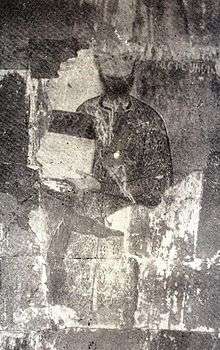Kutsna Amirejibi
Kutsna the Chamberlain, Kutsna Amiredjibi, (Georgian: ქუცნა ამირეჯიბი) (fl. 1350–1415[1]) was a Georgian nobleman active during and in the aftermath of Timur's invasions of Georgia. He was a father-in-law of King Constantine I of Georgia and a maternal grandfather of King Alexander I of Georgia.[2]

Origin
It is not completely clear to which noble house Kutsna belonged. The latter part of his name, Amirejibi, or sometimes written as Amiredjibi, indicates his being a Prince-Chamberlain of the Kingdom of Georgia, but it is also the surname of the aristocratic family better documented from the early 17th century. Modern genealogists in Georgia have accepted the notion that Kutsna was one of the earliest members of that family as plausible.[1] In the view of the historian Cyril Toumanoff, the praenomen of Kutsna as well as that of his grandfather Kurtsik may suggest that he belonged to the feudal house of Khurtsikidze or Khurtsidze from Samtskhe, but, on the other hand the family memory believes and certain historical documents, such as The King George the Excellent's "Khelmtsifis karis garigeba", dated close to 1340-46, suggests that the family surname of Amirejibi is Kvabulidze, or Kobulisdze, in later centuries pronounced as Gabelidze, or even Gobelidze. The first documented appearance of this noble family dates back to 819 A.D.
In his charter, Kutsna mentions his homonymous ancestor as having been a constable of Georgia under Queen Regnant Rusudan (r. 1223–1245). But between the constableship of Zakaria II Mkhargrdzeli (who died in 1212) and that of his nephew Avag-Sargis III Mkhargrdzeli (who filled that office from 1233/4 to 1250), the incumbents of it are not known.[2]
Career and family
Kutsna was married to the lady called Rusa Mkheidze (Rusudan; died 1413). Their daughter, Natia, became the consort of King Constantine I of Georgia and mothered Alexander I, at the time of whose birth c. 1390 Kutsna was ambassador to Constantinople.[2] The chronicles describe him as the one who was "greatly ennobled by the kings" and who "headed the army".[1] Both Kutsna and his wife Rusa are known for their restoration of churches and monasteries in the aftermath of Timur's devastations; Kutsna patronized the churches of Ulumba and Nabakhtevi, and Rusa undertook the restoration of the principal cathedral of the Living Pillar at Mtskheta. She also directed the education of Alexander I[2] and influenced the future king's preoccupations and his enthusiasm for religious building.[3][4]
Kutsna appears in the contemporary records for the last time in 1415. He was succeeded by his son Ramin as the head of the family. Kutsna's fresco portrait as well as those of his wife and four children survive in the Nabakhtevi church, in Shida Kartli, east of Surami.[1]
References
| Wikimedia Commons has media related to Kutsna Amirejibi. |
- (in Russian) Dumin SV, Chikovani YK (1998). Дворянские роды Российской империи ("Noble families of the Russian Empire"), vol. 4, p. 114. Moscow: Likominvest.
- Toumanoff, Cyril (1949–51). "The Fifteenth-Century Bagratids and the Institution of Collegial Sovereignty in Georgia". Traditio 7: 176–177.
- Salia, Kalistrat (1983). History of the Georgian nation, p. 242. Paris: N. Salia.
- Rayfield, Donald (2012). Edge of Empires: A History of Georgia, p. 153. London: Reaktion Books. ISBN 1780230303.